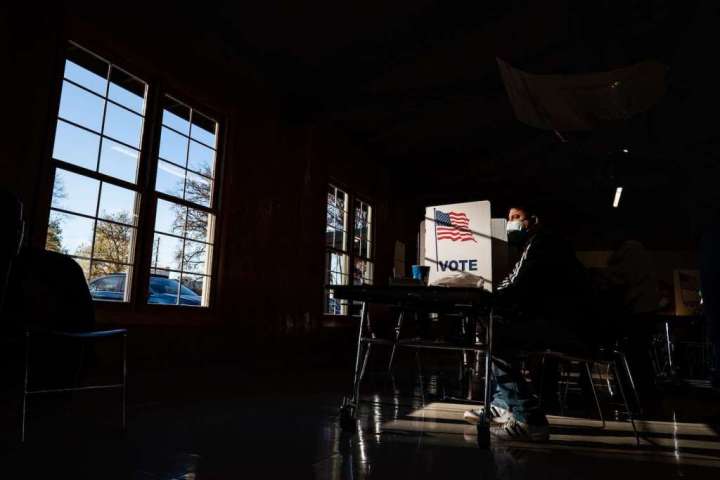Voting rights proponents in Michigan submitted petitions Monday to guarantee at least nine days of early voting, expand the use of ballot drop boxes and ensure that people who forget to bring their ID to the polls can vote.
Michigan activists push for ballot initiative to expand voting access

Backers of the plan turned in nearly 670,000 signatures Monday to the secretary of state’s office to get their proposal on the Nov. 8 ballot. If approved by voters, the measure will become part of the battleground state’s constitution. Efforts are underway in Arizona to pass a similar initiative.
They submitted their petitions the same day other groups turned in petitions meant to guarantee access to abortion.
Some of the provisions in Michigan’s election proposal are aimed at ensuring that Republicans don’t enact voting restrictions. In recent years, Gov. Gretchen Whitmer (D) has been able to block proposals from Republicans who control the legislature, but that could change if she loses her reelection bid this fall or if Republicans use a mechanism to thwart vetoes.
The measure would require every community in the state to have at least one ballot drop box. Those with larger populations would have to have one drop box for every 15,000 registered voters.
The provision on early voting would change how voting is conducted in Michigan. Now, voters can go to election clerks’ offices before Election Day to ask for and submit absentee ballots, but the times for voting vary by jurisdiction, and the ballots are not opened and fed into voting machines until Election Day. Under the proposal, all communities would offer nine days of early voting, and voters would feed their ballots directly into voting machines.
In addition, the proposal would prevent laws or other policies that interfere with the right to vote, making it more difficult for lawmakers to put in place voting limits. Citizens could sue to block any laws or policies they viewed as hampering their ability to vote.
The initiative would also bar voter intimidation; allow voters to request absentee ballots to be sent to them for all future elections; allow voters to track their ballots electronically; require absentee ballots to include prepaid postage; and require the disclosure of donations used to help administer elections.
Under the proposal, only election officials could audit the vote. That would prevent election reviews like the one in Arizona, where dozens of workers for a company hired by Republicans examined ballots with microscope cameras.
The Michigan proposal would also require election officials to certify results based only on election returns. That provision is aimed at preventing election officials from refusing to confirm results, as some Republicans urged after President Donald Trump lost the state in 2020.
The proposal would also ensure that people can vote even if they don’t have a photo ID with them by signing an affidavit. That policy is already in place, but putting it in the state constitution would ensure it doesn’t change.
Khalilah Spencer, president of Promote the Vote, said her group is trying to build on momentum it developed when the 2018 initiative passed.
“Given where our politics are with a split legislature and governor, it’s hard to get anything moving, frankly, so sometimes voters need to take it in their own hands,” Spencer said in an interview.
To get on the ballot, organizers had to submit at least 425,000 signatures — 10 percent of the total number of ballots cast in the 2018 election for governor. They said they had submitted far more than that, and the state board of canvassers must now determine whether they received enough proper signatures to place the proposal on the ballot.
Republicans are working on a counterproposal that would make the state’s voter-ID law more restrictive — a plan Whitmer vetoed last year. Republicans are now gathering signatures so they can put the issue before voters, which would give lawmakers the ability to pass the proposal in a way that could not be blocked by the governor.
“What we want to do is put it in front of the legislature and not have the governor veto it,” said Gustavo Portela, a spokesman for the Michigan Republican Party. “We believe our proposal, which is centered around providing voter ID at the ballot box, is important.”






